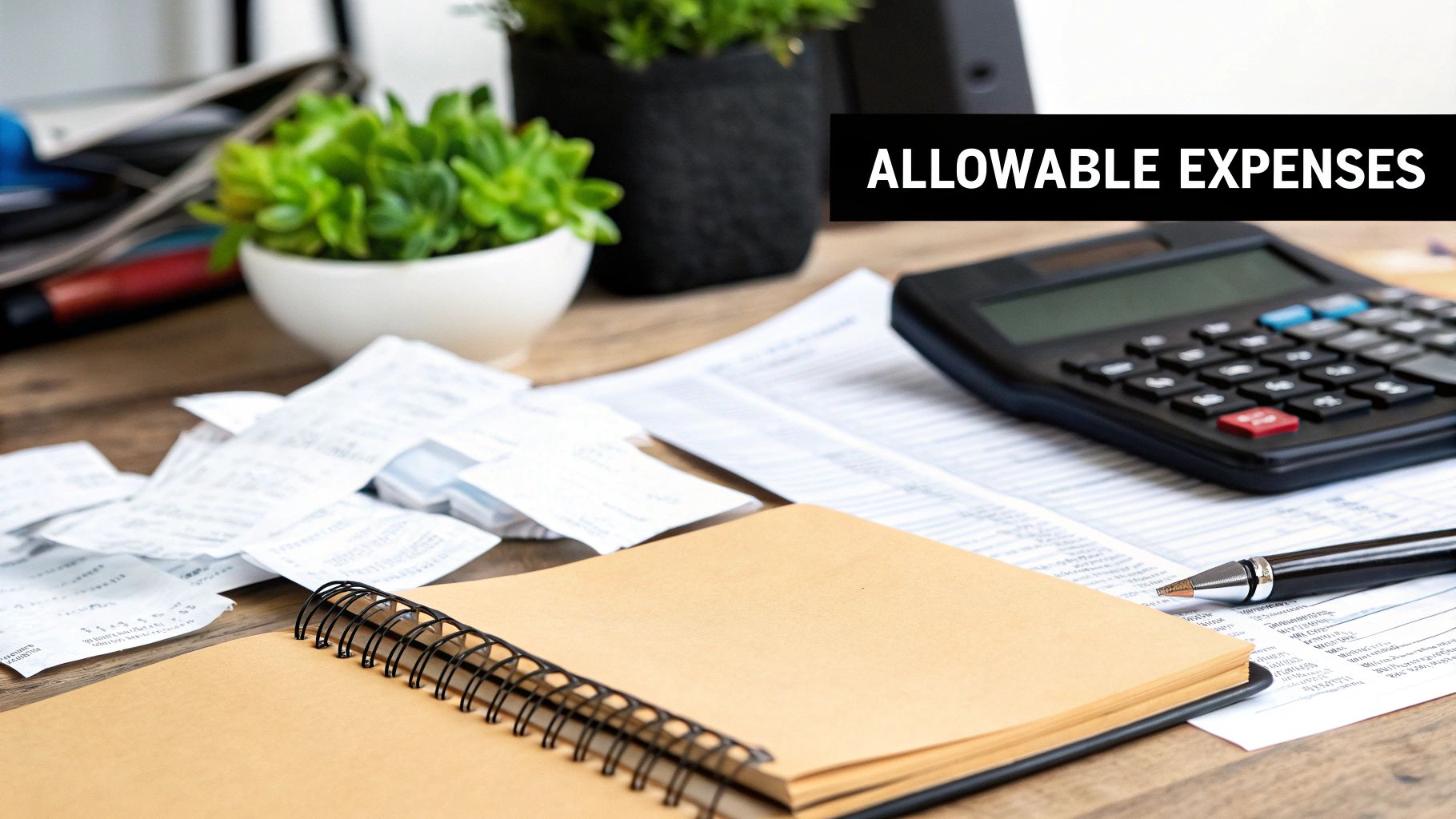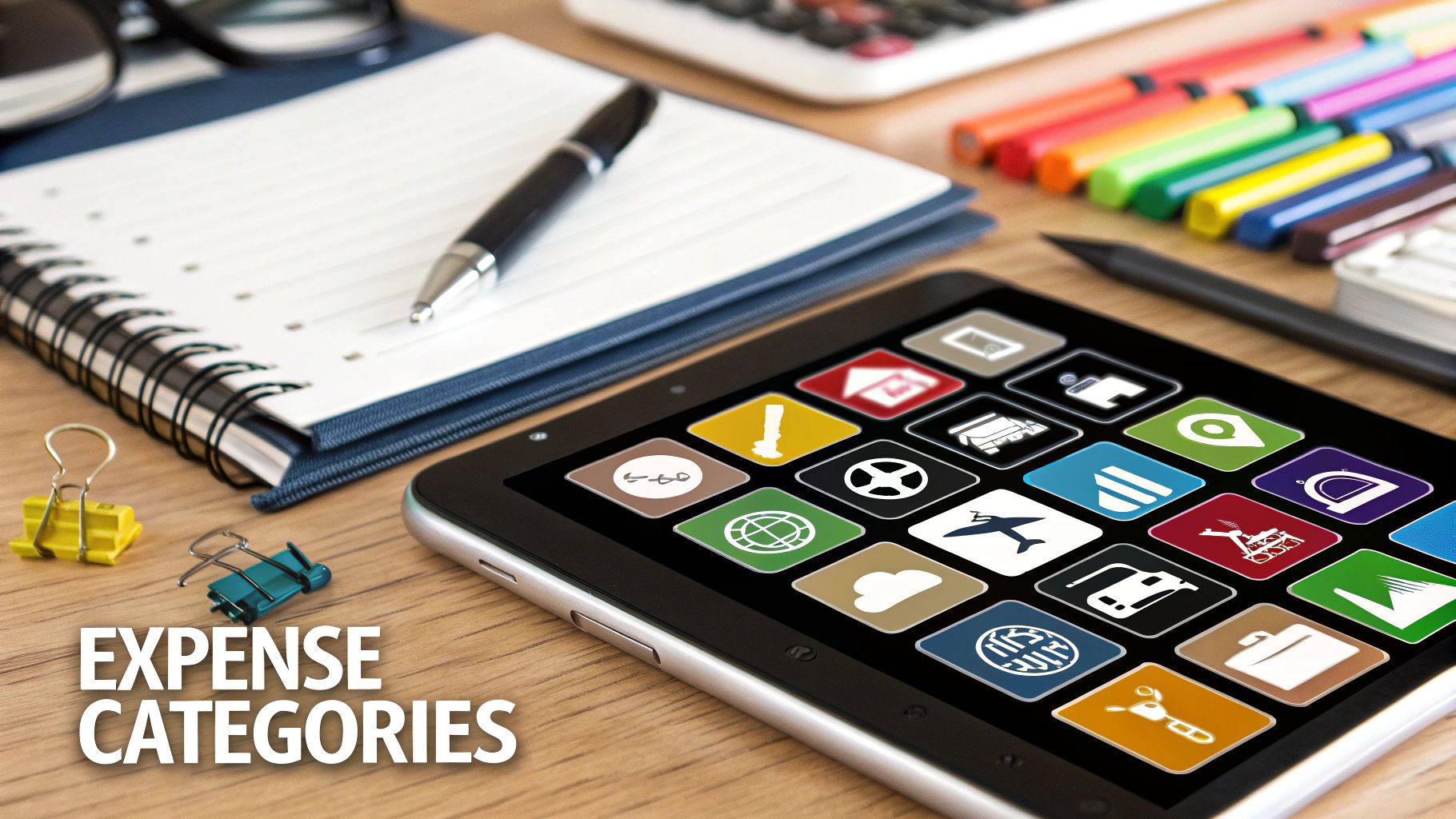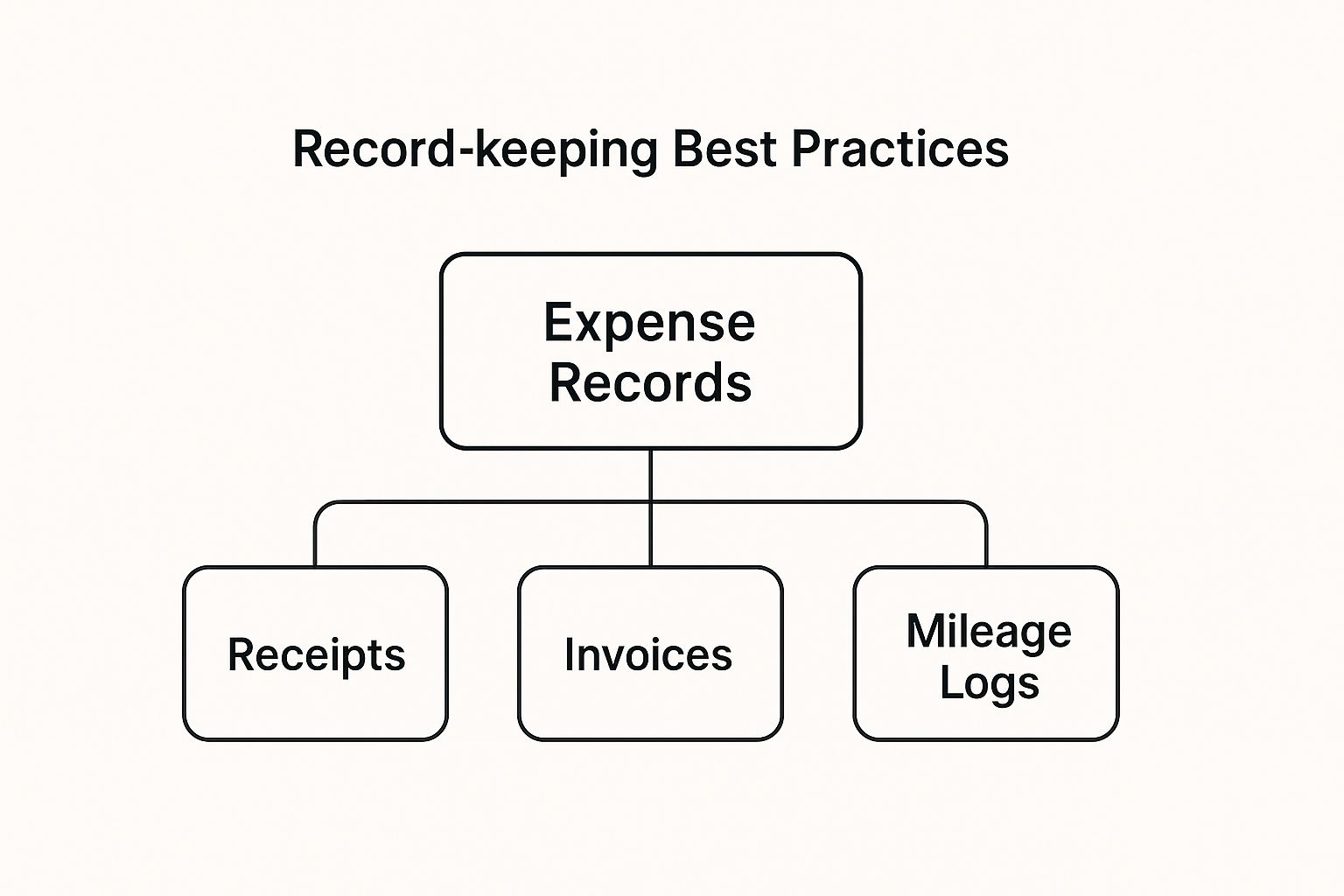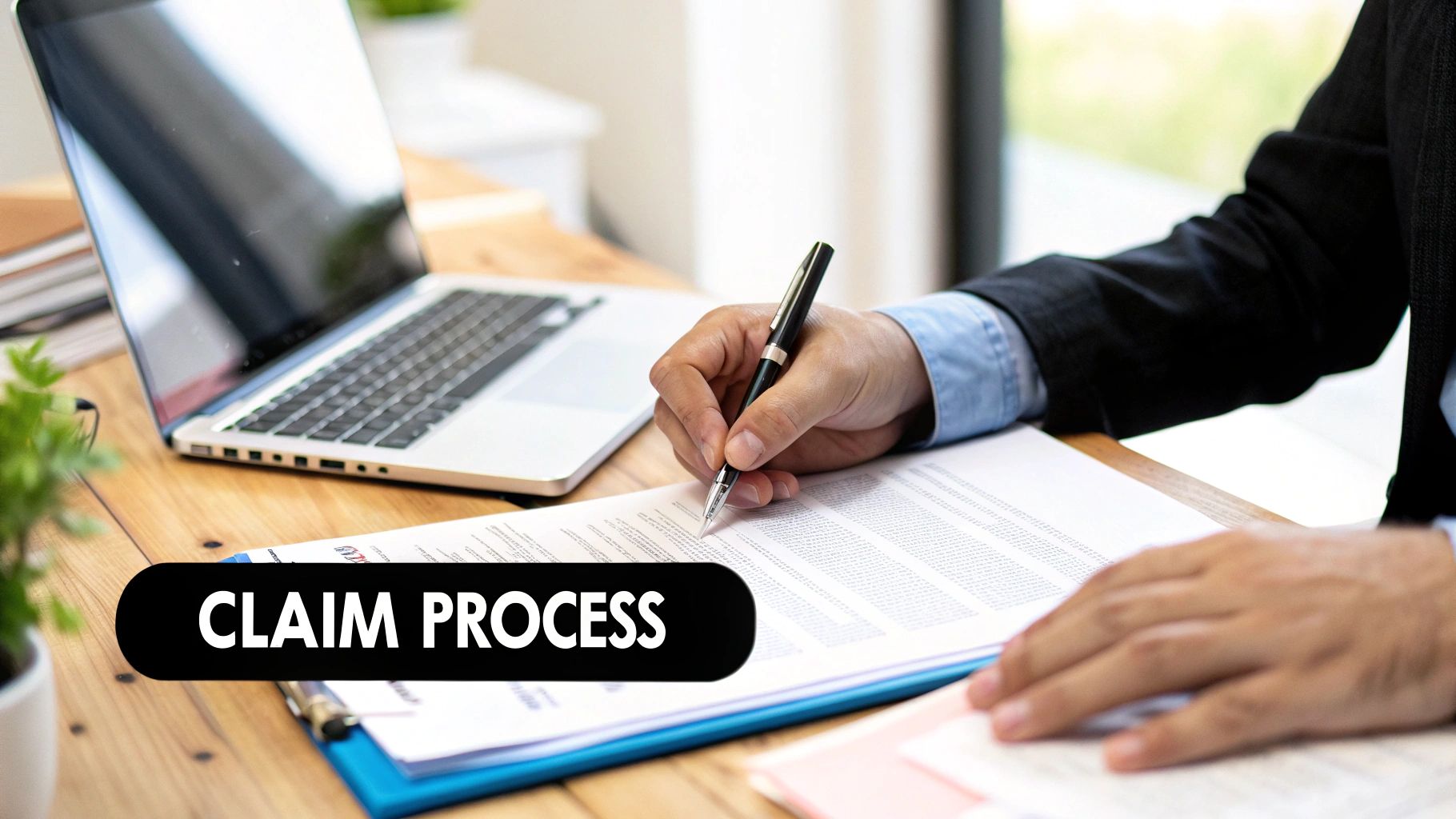When you're running a limited company, getting to grips with what counts as an allowable expense is one of the most important things you can do. At its heart, it's any cost you've paid out wholly and exclusively for your business.
Nailing this isn't just about good bookkeeping; it directly impacts your bottom line. Every legitimate expense you claim reduces your company's taxable profit, which in turn lowers your Corporation Tax bill.
Understanding Allowable Expenses for Your Limited Company

Let's use a simple analogy. Imagine your company is a professional bakery. The money you bring in from selling delicious cakes and pastries is your revenue. But before you can figure out your profit, you have to subtract the cost of your ingredients – the flour, sugar, eggs, and everything else.
Those ingredients are your business expenses. You couldn't run the bakery without them. Your limited company works the same way, incurring costs to generate its income. HMRC’s golden rule is that for a cost to be an allowable expense, it must be "wholly and exclusively" for your trade. This means its sole purpose was for the business, with no personal benefit mixed in.
The Benefits of Diligent Expense Tracking
Thinking of expense management as just a chore is a common mistake. It’s actually a core part of your financial strategy. The biggest win, of course, is a lower Corporation Tax bill. For every pound you claim as a business expense, that's one less pound of profit for HMRC to tax.
But the advantages don't stop there. Meticulous tracking gives you a crystal-clear view of your company's financial health. You can see precisely where your money is going, spot any overspending, and make much smarter decisions about the future.
An accurate expense ledger is the foundation of sound financial management. It not only ensures you meet your legal obligations to HMRC but also provides the data needed for strategic growth and planning.
Keeping detailed proof of every single transaction is essential. This isn't just good practice; it's a legal requirement. Our guide on what records you need to keep for your limited company accounts breaks down exactly what you need to hold onto and for how long. A disciplined approach protects your business and makes it as financially efficient as possible.
The Golden Rules of Claiming Business Expenses

When it comes to deciding what you can and can't claim as an expense for your limited company, HMRC has one very clear, very strict test. At the heart of it all is a simple phrase: the cost must be ‘wholly, exclusively, and necessary’ for your business.
Getting your head around this three-part rule is the single most important thing you can do to manage your expenses correctly. Think of it like a gate with three locks. A potential expense has to unlock all three to be allowed through. If it fails on even one, it's almost certainly not a valid claim against your profits.
This rule exists for a good reason: to stop business owners from claiming for costs that blur the lines between personal and business life. So, let’s unpack what each of those little words really means in practice.
What ‘Wholly and Exclusively’ Really Means
This bit is the absolute bedrock of HMRC’s rules. 'Wholly and exclusively' means the entire reason for spending that money was for your business. There can’t be a personal motive lurking in the background.
Imagine you buy a new laptop. If you use it 100% for work – building client presentations, managing your accounts, firing off business emails – then its cost is wholly and exclusively for your business. Simple. But what if you also use that same laptop to stream Netflix with your family every evening? Now it has a dual purpose, and that’s where things get tricky.
In most cases where there's a dual purpose, the expense gets disallowed completely. The only real wiggle room is if the personal benefit is so tiny and accidental that it's not a factor in the decision to buy it.
Defining What Is ‘Necessary’
‘Necessary’ can sound a bit vague, but HMRC’s take on it is pretty straightforward. Is the expense going to help you run your business and make money? It doesn't mean something you literally can't survive without, but it does need to be appropriate and helpful for what you do.
For example, a web design agency buying a subscription to specialist graphic design software is a no-brainer. That’s clearly a necessary cost. But what if that same agency tries to claim for a fancy, top-of-the-range coffee machine? HMRC might raise an eyebrow, unless the company can show it’s for a dedicated staff kitchen or to serve to clients during meetings.
It all comes down to context. What’s necessary for one business might be an unjustifiable luxury for another.
"To be allowable, an expense must be incurred for the purposes of the trade. If an expense is not incurred wholly and exclusively for the purposes of the trade, it is not allowable." – HMRC Business Income Manual
The Non-Negotiable Role of Record-Keeping
Here’s the thing: an expense can tick all the boxes of the 'wholly, exclusively, and necessary' test, but without proof, it’s completely worthless in the eyes of HMRC. Keeping organised, detailed records isn't just a good habit; it’s a legal obligation.
You need to hang on to everything – invoices, receipts, bank statements. This paper trail is your evidence. As the official guidance highlights, you can only claim costs that have no personal element and are genuinely necessary for your business to lower your corporation tax bill. You can find more details on the UK limited company expense rules on FreshBooks.
If HMRC decides to investigate and you can’t produce the records, they won’t hesitate to disallow the claim. That means a bigger tax bill and, potentially, some nasty penalties. Good record-keeping is your best line of defence.
With the core rules under our belts, let's get into the nitty-gritty. What can you actually claim? Think of the following categories as a practical checklist for your day-to-day business spending.
Getting your head around these common expense types is the first step to building a solid expense-tracking habit. It’s all about making sure you don't leave any tax relief on the table.
Office, Property and Equipment Costs
This is a big one, covering the physical "stuff" and spaces your business needs to operate. If you rent a commercial office, the rent, business rates, and utility bills like electricity and gas are all fair game.
But it also includes all those smaller, day-to-day running costs that quickly add up:
- Stationery: Pens, paper, printer ink, postage – the works.
- Phone and Broadband: The cost of your business landline, mobile, and internet connection.
- Software: Any subscriptions essential for your work, from Xero or QuickBooks to project management tools like Asana.
- Equipment: The hardware that keeps you going, like computers, printers, and office furniture.
Just remember that 'wholly and exclusively' rule. A new desk for your dedicated business office is a clear-cut claim. But if that same desk is going in the family living room and is only used for work occasionally, things get a lot more complicated.
Travel and Subsistence Expenses
Business travel often trips people up, but the logic is sound once you grasp the basic principle. You can claim for travel to a temporary workplace for business reasons, but your regular commute to a permanent workplace is a no-go.
So, what does that mean in practice? You can typically claim for:
- Mileage: Using your personal car for a business trip? You can claim a set rate per mile – currently 45p for the first 10,000 miles and 25p after that.
- Public Transport: Train, bus, plane, and taxi fares for legitimate business journeys are all allowable.
- Accommodation: Hotel costs are claimable when you have to stay overnight for work.
- Subsistence: This covers the cost of reasonable meals and refreshments while you're away on that overnight business trip.
The crucial point here is that your daily journey from home to your normal office is just commuting. HMRC sees that as a personal cost, so it's not an allowable expense.
Staff Costs and Salaries
If you employ people, their costs are one of the most significant—and most straightforward—expenses for a limited company. This isn’t just about the monthly pay run; it’s the whole package of what it costs to have someone on your team.
Allowable staff-related costs include:
- Employee salaries
- Employer's National Insurance contributions
- Employer pension contributions
- Business-related training courses for your team
- Certain staff benefits, like private health insurance
To claim any of these expenses confidently, you need watertight records. This is where meticulous record-keeping becomes your best friend.

As you can see, solid expense records are built on a foundation of receipts, invoices, and specific logs (like a mileage log). These are the documents you'll need to back up every claim you make to HMRC.
Marketing and Professional Fees
You have to spend money to make money, and luckily, HMRC agrees. Any cash you put into promoting your business or getting expert advice is generally tax-deductible. These are the costs that help you grow and stay compliant.
Any cost you incur to win new business or keep your company on the right side of the law is almost always an allowable expense. Think of advertising to find new customers or paying your accountant to handle your tax return – both are essential.
This category really splits into two key areas:
- Marketing and Advertising: This covers everything from your Google Ads campaigns and website hosting fees to printing a fresh batch of business cards and flyers.
- Professional Fees: You can claim for the fees you pay your accountant, solicitor (for business-related matters), or any other professional advisors. This group also includes things like bank charges and business insurance premiums.
To help you visualise this, here’s a quick table summarising some of the most common expense claims.
Quick Guide to Common Limited Company Expenses
This table breaks down some typical business costs, giving you a clearer idea of what usually gets the green light from HMRC and what doesn't.
| Expense Category | Generally Allowable Examples | Generally Not Allowable Examples |
|---|---|---|
| Office & Equipment | Business rent, utility bills, stationery, business software subscriptions, work computers, printers | Rent for your personal home, personal utility bills, non-business software |
| Travel & Subsistence | Mileage for business trips, train/air fares to client sites, hotel stays for work, meals on overnight trips | Daily commute to your permanent office, personal holiday travel, fines |
| Staff Costs | Employee salaries, Employer's NI & pension contributions, staff training, approved benefits | Director's personal expenses, non-business related staff entertainment |
| Marketing & Professional | Website hosting, online advertising, business cards, accountant fees, legal advice for business | Political donations, personal legal fees, entertainment for clients |
By tracking your spending across these categories methodically, you’ll build up a clear, defensible record that stands up to scrutiny and, most importantly, helps lower your Corporation Tax bill.
Navigating Complex Expense Areas and Common Pitfalls

While many expenses for a limited company are black and white, some areas are notoriously grey. It's in these tricky corners of the tax rules where honest mistakes happen—mistakes that can lead to incorrect claims and unwanted attention from HMRC.
Getting to grips with the nuances of these common pitfalls is the key to staying compliant while still making sure you're claiming every penny you're entitled to. Let's clear up some of the most common points of confusion, from home office costs to the classic entertainment trap.
Claiming Home Office Expenses
When your home doubles as your office, you can absolutely claim a portion of your household running costs back from the business. The catch? You can't just throw your entire electricity bill at the company. HMRC gives you two ways to go about this.
- The Simple Flat Rate: This is the no-fuss option. You can claim a flat rate of £6 per week (which works out to £26 per month) without having to show any receipts. It's incredibly easy, but it might not reflect the true cost of running your home office.
- The Actual Cost Method: This route involves a bit more legwork. You'll need to calculate the business proportion of your actual household bills—things like heating, electricity, and even council tax. You must have a fair and reasonable way of working this out, usually based on the number of rooms you use for business or the amount of time you spend working there.
The second method can often lead to a larger, more accurate claim, especially if you have a dedicated room you use exclusively for work. Be aware, though, that calculations involving mortgage interest and rent can get particularly complex.
The Entertainment Expense Trap
This is one of the most common tripwires for company directors. Taking clients out for lunch feels like a business cost, and it is, but how HMRC treats it for tax is a different story. The rules for entertaining clients versus entertaining your own staff are worlds apart.
- Client Entertainment: Any costs you incur taking clients or potential customers out—whether it's for coffee, a meal, or a day at the races—are not allowable for Corporation Tax. You can pay for them through the business bank account, but you can’t deduct that cost from your profits to lower your tax bill.
- Staff Entertainment: On the other hand, the cost of an annual event for your employees, like a Christmas party or summer barbecue, is an allowable expense. This comes with a crucial condition: the total cost per head must not be more than £150 in a single tax year.
Getting these two mixed up is an easy mistake to make. For a much deeper look into how this all works, check out our detailed guide on the taxation of entertainment expenses.
Dual-Purpose Assets and Common Mistakes
What happens when you buy something that you use for both business and personal life? Think about a new high-spec laptop. You use it for work presentations and spreadsheets during the day, but it becomes the family movie machine in the evening.
When an asset has a significant dual purpose, you can typically only claim the business-use portion of its cost. You must be able to justify your calculation of how much use is business-related versus personal.
This "duality of purpose" rule is why many seemingly obvious claims get rejected. Here are a few classic pitfalls to steer clear of:
- Claiming for Everyday Clothing: The cost of a sharp business suit isn’t an allowable expense. Why? Because you could technically wear it to a wedding or another personal event. The only real exceptions are for genuine uniforms or branded protective clothing that you couldn't reasonably wear outside of work.
- Claiming Your Commute: As we touched on earlier, the journey from your home to your permanent place of work is just commuting. It's considered a personal journey and you can't claim the cost.
- Mixing Personal Shopping: It’s tempting to grab a few personal groceries while you're out buying office supplies, but don't try to claim the whole receipt. This is a red flag for HMRC. Always get separate receipts for business and personal purchases to keep your records squeaky clean.
The Shift Towards Digital Expense Management
Remember the days of stuffing a shoebox full of crumpled receipts? Thankfully, those days are on their way out. The way limited companies manage their expenses is undergoing a massive shift, moving away from clunky spreadsheets and paper ledgers and towards smarter, faster digital tools.
This isn't just about keeping things tidy. It's about a very real need for greater accuracy and efficiency. As a company director, your time is your most valuable asset. Every minute spent manually typing in data, checking bank statements, and hunting for lost receipts is a minute you're not spending on growing your business.
Why Digital Tools Are Becoming Essential
A huge nudge in this direction comes from HMRC’s Making Tax Digital (MTD) initiative. MTD means that more and more businesses are now legally required to keep digital records and use specific software to file their tax returns. This government mandate is pushing everyone to modernise their accounting practices.
Modern expense management apps and software are designed to solve the classic headaches of record-keeping. They let you:
- Capture Receipts Instantly: Just snap a photo of a receipt on your phone. The software is clever enough to pull out the important details like the date, supplier, and amount.
- Automate Categorisation: Many of these tools can intelligently suggest the right expense category, which seriously cuts down on the risk of human error.
- Integrate Seamlessly: The data flows straight into your main accounting software, whether that's Xero, QuickBooks, or something else. This keeps your books perfectly up-to-date in real-time.
All this automation doesn't just save you hours of tedious work; it gives you a live, accurate picture of your company's spending. That means better control over your cash flow and the ability to make much smarter financial decisions.
The Benefits of Modern Expense Tracking
Moving to a digital system offers real, tangible benefits that go far beyond just saving time. It’s about gaining genuine financial control and making compliance a breeze.
Adopting digital expense management isn't a luxury anymore; it’s a foundational step towards building a more resilient, efficient, and compliant business. It provides clarity on spending and frees up valuable time for strategic activities.
The numbers back this up. An analysis from the 2025 State of Expense Management report highlighted a 17% rise in UK employees managing expenses at work between 2022 and 2024. Over the same two years, the use of expense apps grew by 4%, while old-school methods like spreadsheets dropped by 4%. You can dig into these findings over on the Findity blog.
This trend shows a clear move towards digital solutions that simply work better. If you're wondering if your business is ready, check out our guide on making the move to digital bookkeeping. Getting on board with these tools now will set your limited company up for a future where digital record-keeping is the only way to operate.
Frequently Asked Questions About Limited Company Expenses
When you're running a limited company, figuring out what you can and can't claim as an expense can throw up some tricky situations. Even when you know the basic rules, real-life scenarios can leave you scratching your head. This section tackles some of the most common questions we hear from company directors, offering clear, no-nonsense answers.
Let's clear up that confusion so you can feel confident about how you're handling your company's spending.
Can I Claim My Mobile Phone Bill?
Yes, you can, but how you claim it all comes down to one crucial detail: whose name is on the contract? This single factor changes everything for HMRC.
If the mobile phone contract is in your company's name, things are simple. The entire bill is considered an allowable business expense, and you can claim the full cost. HMRC doesn't even get hung up on a bit of personal use. This is by far the most straightforward and tax-efficient way to handle it.
But if the contract is in your personal name, it gets more complicated. You can only claim for the costs directly related to your business calls and data. This means you'll have to painstakingly separate the business usage from the personal, which can be a real headache to calculate and prove. For your own sanity and to maximise the tax relief, it's almost always better to put the contract in the company's name from the start.
What Is the Difference Between Staff and Client Entertainment?
This is a big one, and a classic pitfall. The tax rules for entertaining clients versus your own staff are worlds apart, and mixing them up can lead to a nasty surprise from the taxman.
Let’s start with clients. Taking a potential customer out for lunch or to a sporting event might be great for business, but it's not an allowable expense for Corporation Tax. The company can, of course, pay for it, but you can’t deduct that cost from your taxable profits.
Entertaining your own employees, on the other hand, is a different story. An annual event, like a Christmas party or summer barbecue, is usually an allowable expense. The key rule here is the £150 per head limit (including VAT) for the tax year. Stay under that, and you're fine. But be warned: if you go over that magic number by even a single penny, the entire cost becomes a taxable benefit for your employees.
How Long Must I Keep Expense Records?
HMRC is very clear about record-keeping, and the penalties for not complying can be steep. You are legally required to hold onto all your accounting records, which means every single receipt, invoice, and bank statement related to your expenses.
For a limited company, the rule is you must keep these records for at least six years from the end of the financial year they relate to. This isn't just good practice; it's the law.
The good news? Digital copies are perfectly fine. In fact, scanning your receipts and storing them in the cloud is often a much safer bet. Digital records don't fade, get lost in a coffee spill, or get accidentally thrown out. Good, organised records are your best defence if HMRC ever decides to take a closer look at your accounts.
Managing your limited company's finances can feel like a minefield, but you don't have to navigate it alone. Stewart Accounting Services specialises in helping directors handle their tax obligations, making sure you claim every allowable expense without falling foul of the rules. Let us take care of the details, so you can get back to growing your business. Visit us at https://stewartaccounting.co.uk to see how we can help.

